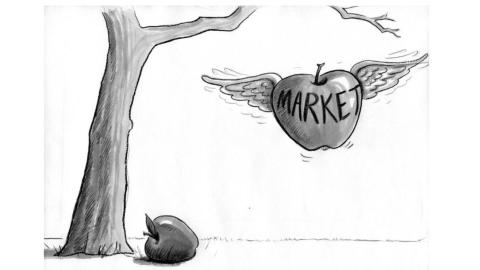Are We Letting Unnatural “Laws” Mislead Us?

We’re letting unnatural “laws” mislead us. Markets aren’t like gravity; they’re ruled by neither laws of nature nor commandments carved in stone. Delegating our ethics to markets risks costly error.
1. A failed 50-fold drug price increase (Daraprim $13 to $750) is revealing. It recalls the irritation over Uber’s 700 percent snowstorm “surge pricing,” when free-market fans groaned: People just don’t understand “simple economics.”
2. I’d say some free-marketers simply don’t understand people. Or people’s ethical reactions. Despite labeling large price hikes “logical and fair” or rational and efficient, they still smack of exploitation and upset people. Economics entails ethics (forceful, systemic, global, ethics) and rightly provokes “fairness” reactions.
3. The relevant “simple economics” is the “law” of supply and demand. Roughly: Price signals ensure markets “clear” efficiently. Rising prices = greater demand = encourage more supply, and vice versa. “Clearing” means all supply is sold (not necessarily used efficiently).
4. Let’s compare two allocation schemes: An entrepreneur makes 100 widgets for $10 each. Using cost-plus pricing, she sells all for $13 each = $300 profit. Using what-the-market-can-bear price maximization she sells at $750 each = $74,000 profit. Way better for her, obviously. But overall? Is it better that 100 customers have $737 less? How they use $737 might benefit the economy more (higher economic multiplier).
5. Again, market rules aren’t facts of nature. They’re choices, which shape incentives and guide markets toward certain goals. Our rules needn’t prioritize supplier profits over other community goals. Note: Cost-plus doesn’t limit profit — to make more, satisfy more customers. Free-marketers might prefer price-gouging, but its benefits aren’t self-evident. Unless taught, market logic is “cognitively unnatural.”
6. Plus market “mechanisms” empirically vary (whereas gravity-like laws of nature are nonnegotiable — they work the way they work no matter what we do). E.g., some markets use cost-plus pricing (= once popular within economics).
7. Before heeding the “free-markets-in-everything” crowd, remember that markets are human-made systems for allocating resources. Before letting market forces (mindlessly) coordinate countless transactions, remember how flat-out wrong economists can be (and that they use “rational” and “efficient” differently, sometimes misleadingly).
8. Besides, economics and its “laws”/claims often fail. Free markets neither logically nor empirically automatically convert self-interest to social good, nor generate “spontaneously ordered” optimal outcomes. It’s not that simple.
9. Those who love the many great things that markets do could work harder to fix related ills. Nothing compels us to let Californians water lush lawns while the poor’s wells run dry, or make musical toilets while some starve. Widgets, medicine, Uber, musical toilets, food, and water aren’t ethically equivalent, or equally auctionable. Let’s pick allocation schemes accordingly.
10. We can use the massive power of market forces to support our ethical goals. Perhaps America’s founding goal of rules “wholesome … for the public good.”
But if you’d prefer a world safe for price gouging, let’s do more “simple economics” training: market-gouging drills in kindergarten? Daily pledges “one Nation under” profit … dedicated to the idea “that government of the people, by the people,” for the profit, shall not perish from the Earth?
Illustration by Julia Suits, The New Yorker cartoonist & author of The Extraordinary Catalog of Peculiar Inventions





